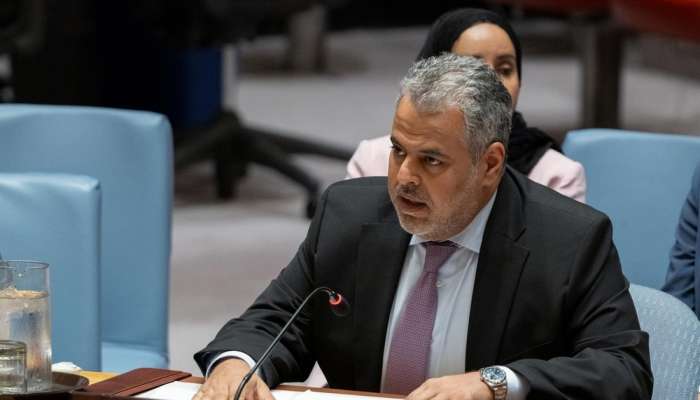
New York: The Sultanate of Oman condemned the blockade imposed on the Gaza Strip, warning of the consequences of the continued use of starvation and forced displacement as weapons of war. Oman stressed the need to hold perpetrators accountable for these grave violations.
This was stated by Omar bin Saif Al-Kharousi, the Permanent Representative of the Sultanate of Oman to the United Nations, before the Security Council during discussions on "The Situation in the Middle East, including the Palestinian Cause."
He said that the Middle East continues to face various challenges since the establishment of the United Nations, particularly the Palestinian issue and the inalienable rights of the Palestinian people. Gaza has now become one of the most horrific scenes of humanitarian disaster due to the brutal Israeli aggression against thousands of innocent civilians, he added.
He warned against international complacency in stopping this aggression, emphasizing that the daily massacres, collective starvation, and systematic targeting of civilians and infrastructure—including hospitals, schools, and shelters—constitute a blatant violation of all international norms and conventions and amount to crimes against humanity.
The Sultanate of Oman has expressed its deep appreciation for the tremendous efforts made by UN agencies, particularly UNRWA, and its field staff who continue their humanitarian work under the most severe conditions, risking their lives to deliver humanitarian and medical aid to civilians in Gaza.
Oman has condemned attempts to weaken UNRWA and obstruct its humanitarian operations, calling on the international community to ensure its continued funding and support so that it may fulfill its vital mandate.
Further, Oman stressed the necessity of providing protection for UN personnel and ensuring their work continues unimpeded and free from targeting. It emphasised that the Security Council cannot demand respect for its resolutions on other issues while turning a blind eye to the implementation of its decisions on the Palestinian cause, particularly Resolution 2735 (2024), which called for an immediate ceasefire.
Oman has urged the Security Council to assume its historical responsibility by adopting a clear resolution demanding a comprehensive and immediate ceasefire, ensuring international protection for the Palestinian people, and urgently recommending the admission of the State of Palestine as a full member of the United Nations—a step toward rectifying the historical injustice that has persisted for over seven decades.
The Sultanate of Oman has praised the noble mediation efforts undertaken by the Arab Republic of Egypt, the State of Qatar, and the United States of America to halt the aggression and establish a lasting truce. It also supports the recovery and reconstruction plan proposed by Egypt in coordination with the State of Palestine and backed by Arab and Islamic nations, which offers a glimmer of hope for people who have endured international neglect, displacement, and destruction. Oman further commended the efforts of the French Republic, the Kingdom of Saudi Arabia, and ongoing preparations for an international peace conference aimed at implementing the two-state solution.
Additionally, Oman has affirmed that the continuation of occupation and settlement activities, along with the obstruction of just peace opportunities, will inevitably lead to further deterioration and escalation in the region. The only path to achieving security and stability in the Middle East lies in ending the Israeli occupation of all Arab territories, withdrawing from the Syrian Golan, restoring Lebanon’s full territorial sovereignty, compelling the occupation to implement all relevant UN resolutions, and ceasing any attempts to gain control over the occupied lands.
In concluding its statement, Oman has asserted that the security and stability of the region can only be achieved by recognising the legitimate rights of the Palestinian people, foremost among them the right to establish their independent and sovereign state on the borders of 4 June 1967, with East Jerusalem (Al Quds) as its capital—based on international legitimacy resolutions and the Arab Peace Initiative.